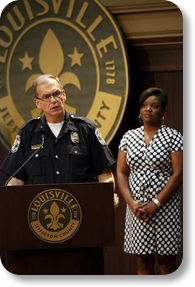
Spurred by four fatal shootings in just over a week, city officials on Friday announced a series of steps aimed at curbing the violence in west Louisville - including a more targeted approach to arresting those responsible for a disproportionate number of crimes.
Police Chief Steve Conrad said his department would begin using "intelligence-led policing" to target such offenders and work more closely with other law enforcement agencies in the Louisville area to see they are jailed.
Conrad said "we have a very small number of very active criminals in our community," and, "The hope is that we can keep the most dangerous individuals in the system."
The city also is forming a panel to help identify and address issues that allow the violence to occur - from poor neighborhood conditions to the need for better coordination of service agencies and greater involvement from the broader community.
J. Blaine Hudson, dean of the College of Arts and Sciences at the University of Louisville, will lead that group.
"We've been a diverse community ever since Louisville was settled, but we haven't always functioned as one community," Hudson said Friday during a media conference announcing the effort. "Our ultimate goal is to try to achieve that for everybody in this community."
Mayor Greg Fischer will appoint other group members, with suggestions from community and Metro Council members, said Sadiqa Reynolds, the city's chief for community building.
Fischer did not attend the announcement because he's in Washington, D.C. But his spokesman, Chris Poynter, said he expects the other members to be announced within the next 10 days.
In a statement Friday, Fischer noted that problems with violence "didn't start yesterday and they won't be solved tomorrow. However, the talented people that we will assemble will examine the problem of violence from all possible angles and develop a long-term, thoughtful strategy."
Hudson had, just a day earlier, expressed concerns about past efforts to address issues in Louisville's black community, saying that they often fade away without much action once crises subside.
"You can't guarantee that that won't happen," Hudson said Friday. But given the push from Fischer, he said, "I think the circumstances now are a bit more favorable."
In a period of less than two hours on May 17, six people were shot on 32nd Street in the Parkland neighborhood. Dead were Tyson Mimms, 24, and Craig "C.J." Bland Jr., who perished on the 900 block of 32nd. Two others were injured in that shooting, and no arrests have been made, police said.
Soon after, Makeba Lee, 24, was gunned down after an altercation near the crime scene; the alleged shooter, Cheetara Goldsmith, was shot and injured by Louisville Metro Police Officer Vadim Dale.
On Thursday, Goldsmith, 24, was released from University Hospital and taken to Metro Corrections. Police accuse Goldsmith of Lee's murder, and first-degree wanton endangerment. A $500,000 cash bond was set for her on Friday, and a district judge ordered her to avoid firearms.
Her attorney, Scott Barton, declined to comment.
As part of the effort announced Friday, Metro Public Health and Wellness officials said they are considering forming a "Crisis Response Team" composed of mental health and other professionals, on call 24-hours a day, who would be dispatched to violent crime scenes to help victims cope with the emotions.
The team would also work to diffuse situations that arise at the crime scene, such as the altercation that apparently led to Lee's shooting.
The first step of the city's strategy will be an inventory of programs and services already offered to young residents of western Louisville, Reynolds said.
"We definitely need to determine what is already out there," she said.
Public Health and Wellness officials will also look to see what's being offered in terms of self-esteem enhancement, career-orientation and conflict meditation, director LaQuandra Nesbitt said.
The city is asking groups that provide such services to fill out a survey on the Louisville Metro website, www.louisvilleky.gov. June 15 is the deadline for completing the survey.
The Rev. Charles Elliott Jr., pastor of the King Solomon Missionary Baptist Church, said Friday that he is
hopeful that the city's new efforts will include addressing the hardship young felons have in finding job. Those youth, he argued, tend to commit much of the violence in western Louisville, but they'd be willing to work if they could.
"I've been pastoring here for 50 years," Elliott said. "When we all come together and work together, we can make a difference. It needs to happen."
Regina Mitchell, a Parkland resident, said she's hopeful the working group will look at ways to address abandoned, vacant properties. Those dilapidated buildings can harm how communities perceive themselves, she said.
Mitchell owns Sunny Angels Child Care on 32nd Street, yards from where the shootings took place last week.
"I believe there's hope," Mitchell said. "There's always hope if they can stay committed to coming together and working on it together."







